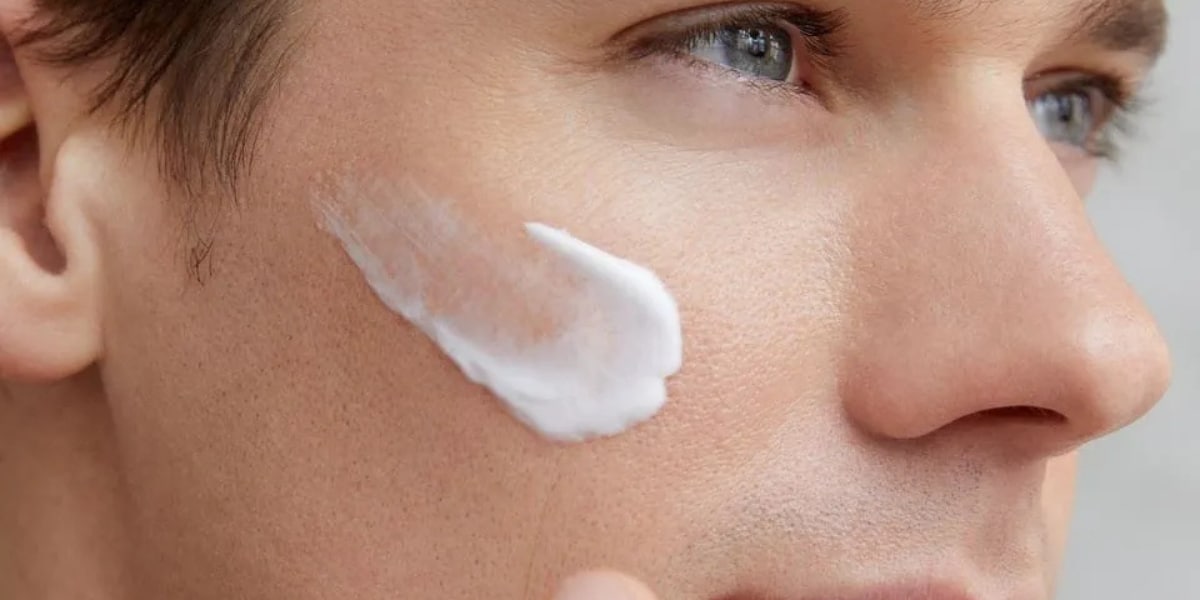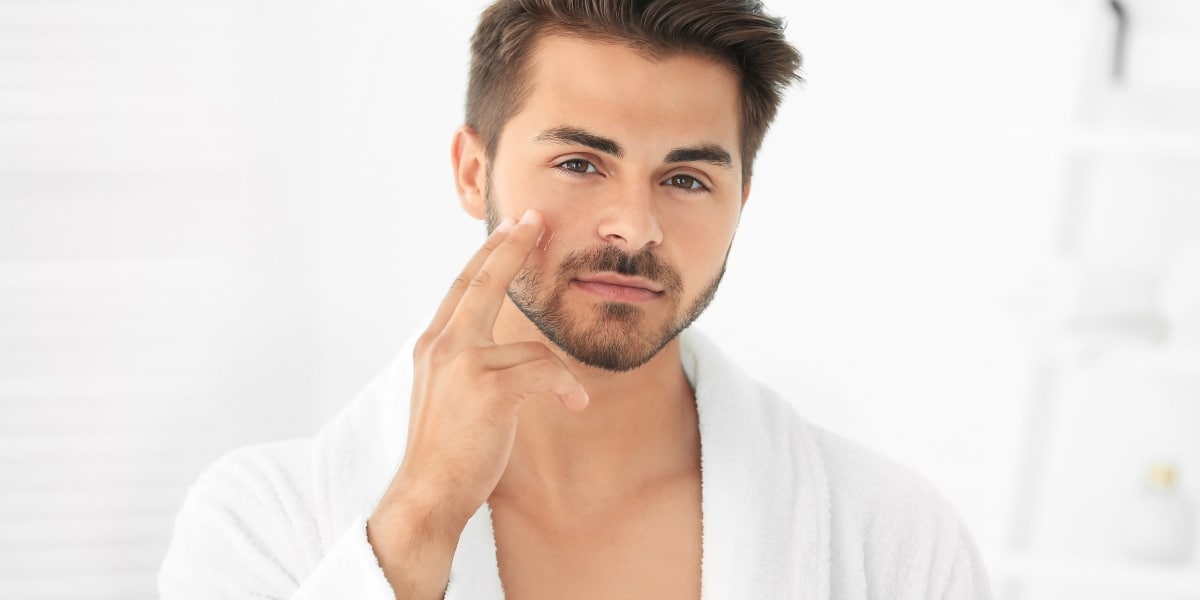Blog
Essential Skin Care Routine for Men: Step by Step

Taking care of your skin should be an essential part of every man’s grooming routine. It doesn’t need to be complicated, it can be minimal, yet powerful. But with so many products and steps pushed on men today, creating an effective skincare regimen can feel overwhelming. Men’s skin health is just as important as women’s, yet it often receives different attention. Surprisingly, 33% of men admit they don’t wash their faces daily, and only 59% of men aged 18 to 24 believe they need to look after their skin.
In this comprehensive guide, we’ll demystify the world of men’s skincare and provide a step-by-step routine for clean, clear, healthy skin specifically tailored for men. You’ll learn the basic steps like cleansing, moisturizing and sun protection. We’ll also cover which additional targeted products address concerns like acne, razor irritation, signs of aging and more.
Follow this guide’s tips to establish your daily skincare regimen. Your skin will thank you!
Why Men’s Skincare Is Different To Women’s
Although there are similarities between men’s and women’s skin care needs there are also many differences. It all comes down to hormone differences between men and women, as men have much higher levels of testosterone which makes the skin 25 percent thicker and behave differently from women’s. The higher levels of testosterone also lead to denser hair follicles, oilier skin and larger pores which pump out sebum.
Due to the differences between men’s and women’s skin, men need to find products that are specifically designed for their needs. Men therefore require active ingredients that contain higher concentrations with better absorption to penetrate thicker skin and formulas that are more focused on oily skin.
Why Skin Care Matters for Men
Great skincare starts with understanding why taking care of your skin needs to be a lifelong habit for men:
- Skin is the body’s largest organ: It plays a major role in health and immunity, so keeping it healthy matters.
- Fight visible aging: A proper routine maintains a youthful appearance and prevents wrinkles.
- Look your best: Radiant, clear skin makes you look healthy, well-rested and polished.
- Be more confident: Having great skin can give your self-esteem a boost.
- Prevent skin cancer: UV protection helps prevent melanoma and other skin cancers. Men are at higher risk than women.
- Treat skin conditions: A regimen treats issues like acne, dryness, razor burn, clogged pores and sun damage.
Every man can benefit from a skincare routine tailored to his lifestyle and needs. Making it a daily habit is crucial for both short and long-term skin health.
What Skin Type Do You Have?
What’s your skin like at baseline? No, we’re not talking about whether you get acne or not, but the actual character of your skin.
Your skin type can change over time depending on your age, activity level, and hormones. Skin type matters because it determines which skincare products that will work best for your skin.
Normal
Normal skin is defined by what it’s not: It’s not excessively oily, dry, or irritated. If your skin tends to look just fine without any maintenance, you probably have a normal skin type. People with normal skin can use most skincare products without a problem.
If you have no major issues like frequent breakouts or dryness, you likely have normal skin. The essential steps above like cleansing, SPF and moisturizing are sufficient to maintain balanced skin.
Oily
Everyone has oily skin if they don’t wash for a few days, but if your skin is chronically oily—no matter how clean you keep it—you probably have an oily skin type. People with oily skin want to use gel-based cleansers and moisturizers, since these won’t add extra oil to the skin.
- Use an oil-free, salicylic acid cleanser
- Gently exfoliate 2-3 times per week
- Spot treat with benzoyl peroxide gel (prescription)
- Hydrating, lightweight oil-free moisturizer
- Broad spectrum SPF 30-50
Dry
Many people experience seasonal dryness in the winter months, but some people experience flaky, itchy, dry skin on their face year-round. If you have dry skin, look for cream-based products that will help with hydrating your skin.
- Gentle creamy cleanser
- Hydrating serums with hyaluronic acid
- Heavy, fragrance-free moisturizer
- Night cream with antioxidants
- Weekly exfoliating to remove flaky skin
- Broad spectrum SPF 30-50
Combination
People with combination skin have oily and dry areas. For example, combination skin might present as an oily nose or forehead with dry cheeks or chin. If you have combination skin, you may need to treat your face in zones, using a combination of different products in different areas depending on your areas of oiliness and dryness.
- Gel or foam cleanser for oily zones
- Creamy cleanser for dry areas
- Moisturizer with ceramides
- Hydrating serum for dry spots
- Clay mask weekly to balance and mattify
- Broad spectrum SPF 30-50
Sensitive
Sensitive skin is easily irritated by products or the environment. People with sensitive skin have to be careful which skincare products they use, since some products can cause rashes or redness. If you have sensitive skin, look for products that are labeled as “gentle” or “hypoallergenic.”
Mature Skin
Mature skin isn’t technically a skin type. However, as we age, our skin ages in particular ways, making mature skin worth differentiating from other skin types. Mature skin is drier, thinner, and less elastic. Skincare products that promote collagen production and protect the skin barrier are best for people with this skin type. Additionally, products that provide hydration are important for those with mature skin.
- Gentle, non-drying cleanser
- Serum with antioxidants like vitamin C
- Anti-aging night cream with retinol
- Eye cream or eye patches for wrinkles and sagging
- Broad spectrum SPF 30-50
Begin with a Simple Skin Care Routine
Get started by developing a simple skin care routine that you can do both morning and night. Simply washing your face and incorporating a daily moisturizer will clear impurities and help build a healthy skin barrier.
A Full Step-by-Step Skin Routine for Men
Layer in additional steps once you’re ready to take your routine to the next level.
Step 1: Cleanser
A good exfoliating facial cleanser or scrub helps keep your pores clear of dirt, oil and other impurities.
- Wet your face with warm water.
- Apply facial cleanser all over your face and neck for about 10 seconds.
- Rinse clean with cold water to close your pores.
- Gently pat your face dry with a clean towel—never rub it.
Step 2: Toner
Toner prepares your skin for the rest of your basic skin care routine. It also helps replenish your skin after cleansing.
- Apply toner to a cotton pad without over soaking it.
- Sweep the wet cotton pad outward in gentle strokes from the center of your face.
- Avoid your lips and eyes.
- Allow the toner to dry on its own.
Step 3: Serum
Serums contain antioxidants and vitamins to help nourish your skin. But there are so many different types available that choosing the right one can be a challenge if you’re new to taking care of your skin. Consider a hydrating serum, antioxidant serum, brightening serum or anti-aging serum depending on your skin type and concern. Always check the bottle for specific instructions, but here’s how you usually apply it:
- Squeeze a couple of drops from the dropper into the palm of one hand.
- Rub your hands together.
- Press serum into your dry face and neck with both hands.
Step 4: Moisturizer
Always use moisturizer both in the morning and night, as it can help combat extreme dryness as well as oiliness by balancing your skin.
- Make sure your face is slightly damp (using a face mist works well) so that you can lock in the moisture.
- Apply a pea-sized amount of moisturizer to one hand.
- Rub your hands together.
- Using gentle upward and outward strokes, apply to the face and neck.
Step 5: Eye Cream
Eye cream nourishes the sensitive skin around your eyes. It reduces puffiness, helps brighten dark circles and is especially great for anti-aging, firming and tightening.
- Use a pea-size amount per eye.
- Using the pads of your fingers, apply your eye cream in very small dots near the inner corner of your under-eye and work outward.
- Apply to your orbital bone and under your eyebrow.
- Pat the eye cream gently until it soaks in, rather than rubbing it in.
Step 6: Sunscreen with SPF 30
Too much exposure to ultraviolet (UV) light causes most skin cancers. Sunscreen with an SPF of at least 30 will help protect your skin from UV rays. Use it year-round, not just during the summertime. The best skin care routine for men finishes with sunscreen.
- Squeeze a nickel-size amount into your palm.
- Rub your hands together.
- Apply to your face and neck with upward and outward strokes.
ADDITIONAL SUPPLEMENTARY SKINCARE STEPS
There are additional steps that you may want to add to this simple 5-step skincare routine, these include:
Facial serum
There are many types of serums available to you with various active ingredients to focus on different skin concerns. Facial serums contain concentrated active ingredients (such as Vitamin E, Hyaluronic Acid or Bakuchiol) with fewer additives (thickeners, emulsifiers or oils). This allows for the quicker absorption of higher concentrations of effective ingredients that help boost skin complexion.
Face masks
You can find a sheet mask for any skin type or skin concern. They’re easy to use and can make your simple skin care routine a little more fun. Any advanced skin care routine for men should include the occasional mask.
- Find a mask for your desired results (anti-aging, detoxifying, brightening or deep-cleaning).
- Apply to clean skin.
- Check the instructions for the recommended time to leave it on.
- Remove according to instructions.
- Enjoy your brighter, smoother skin.
Shaving balm
The skin can be very sensitive after shaving, and it is important to take those extra few moments to give your skin attention post-shave. Use a good quality post-shave balm to soothe, cool and revitalize your skin. The balm not only protects the sensitive skin post-shave, it also instantly protects skin from 5 signs of skin irritation: burning, redness, dryness, tightness, and micro-cuts.
Skincare Tips for Men
To help get the most out of your new skincare routine for men, keep the following tips in mind.
- Know your skin type: Everyone’s skin is unique, so all skin regimens for men should take into account whether your skin is generally normal (i.e., usually clear and not sensitive), oily, dry, combination, or sensitive. If you’re unsure of your skin type or what the best customized routine may be, always ask your dermatologist.
- Wash your face day and night—and after working out: Our facial skin gets a lot of air exposure—including all the dirt and pollutants that come with it. To keep it fresh and clean, be sure to cleanse in lukewarm—not hot—water daily, before and after bed, as well as after you’ve broken a sweat.
- Avoid products with fragrance if you have sensitive skin: If your skin is easily irritated, look for gentle products that are fragrance-free. This is because fragrances may cause dryness and irritation for people with already sensitive skin. You’ll also want to watch out for formulas labeled as “unscented,” as this doesn’t necessarily indicate that they lack fragrances—it may only mean that they contain an ingredient or ingredients that mask aromas.
- For acne-prone skin, look for “oil-free” or “non-comedogenic” on the label: Skincare products that are labeled as being oil-free or non-comedogenic won’t clog your pores. This can be especially important if your skin is acne-prone or vulnerable to breakouts and blemishes.
- Read ingredient labels—and pair wisely: Even if you think you’ve found the best men’s face routine, make sure to check the labels on each product to be sure that all the ingredients you’re layering play well with each other.
- Moisturize daily: We know that water is essential for life—and 64% of our skin is made up of H2O. Applying a moisturizer daily—especially while skin is still damp after cleansing—helps trap our natural reservoirs while also replenishing any moisture that’s been lost. And if that isn’t enough reason to stay moisturized, remember that well-hydrated skin looks younger and less dull.
- Make sunscreen a priority: Even on cloudy days, your skin still needs protection from the sun’s harmful rays—especially between 10 a.m. and 2 p.m., when UV rays are at their peak. Look for a broad-spectrum SPF of 30 or higher, and consider wearing protective clothing—like lightweight, long-sleeved shirts and pants, UV-blocking sunglasses, and a wide-brimmed hat.
- Shave properly: If you shave, be kind to your skin. The American Academy of Dermatology (AAD) notes that while multi-blade razors may seem like a more efficient way to get baby soft skin, sometimes, they can work too well, resulting in razor burn, razor bumps, and ingrown hairs. To protect yourself, avoid dry shaving and, instead, moisten your skin and hair to soften them. Don’t go against the grain either—rather, go with the flow and shave in the direction of your hair growth. Rinse your razor after each swipe, and consider your razor’s lifespan to be about five to seven shaves.
Conclusion:
A solid skincare routine is not just about looking good—it’s about feeling good and taking care of your health. For men, maintaining a simple yet effective skincare regimen can prevent common issues like acne, dryness, and irritation, while also protecting against the long-term effects of aging and sun damage. By following the basic steps of cleansing, moisturizing, and using sunscreen, you can achieve clear, healthy skin with minimal effort. Understanding your skin type and incorporating targeted treatments as needed will take your routine to the next level. Remember, consistency is key—make skincare a daily habit, and your skin will thank you for years to come.
Frequently Asked Questions (FAQs)
1. How often should I wash my face?
You should wash your face twice a day to keep your skin clean and remove any impurities. It is recommended to use a gentle face wash that suits your skin type.
2. How often should I exfoliate?
Exfoliating your skin is important to remove dead skin cells and reveal new skin for a smoother complexion. It is best to exfoliate your face twice a week with a gentle exfoliator.
3. How can I determine my skin type?
Understanding your skin type is crucial for choosing the right products and creating an effective skincare routine. You can determine your skin type by considering factors such as oiliness, dryness and sensitivity.
4. How can I protect my skin from harmful UV rays?
The sun’s UV rays can be harmful to your skin, causing damage and premature aging. To shield the skin from these rays, make sure to apply sunscreen with a high SPF, wear protective clothing and seek shade when the sun is strongest.
5. What is the importance of a skincare routine?
A consistent skincare routine is essential for maintaining healthy skin. It helps your skin stay balanced, addresses specific skin concerns and can prevent future issues. Following a baseline skincare routine is the first step towards achieving radiant and youthful-looking skin.
6. Can you provide some tips for a skincare routine for men?
Skincare is not limited to women. Men should also take care of their skin to keep it healthy and vibrant. A skincare routine for men should include cleansing, exfoliating, moisturizing and sun protection.
7. How does sleep affect the skin?
Sleep plays a crucial role in skin health. While you sleep, your body rejuvenates and repairs itself including the skin. This is when new skin cells are produced and products can effectively penetrate the skin. It is important to have a good nighttime skincare routine to take advantage of these benefits.



